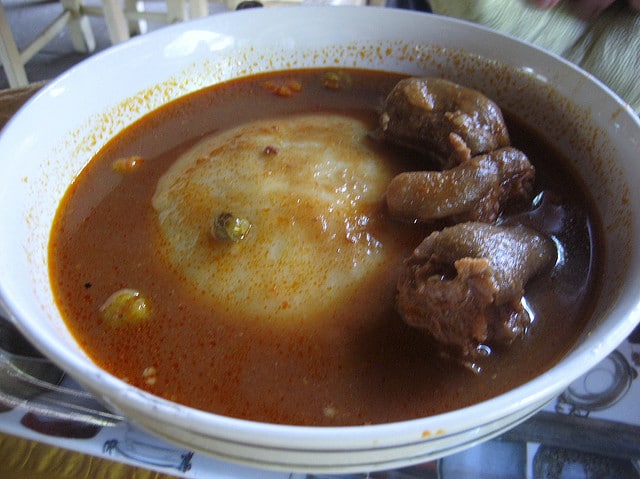
Fufu. Photo courtesy dearanxiety.
When traveling, experiencing the food of a culture can be one of the most exciting parts of the journey. Not only can you learn a lot about a group of people by their dining etiquette, but eating itself is fun.
Recently, I was lucky enough to take a trip to Ghana in Western Africa where dining rules and the cuisine itself differ greatly from that of Western culture. One specialty that is a local favorite, as well as a dish on every visitor’s list of foods to try, is fufu.
At first glance, fufu looks just like a lump of mashed potatoes sitting in some kind of soup. In your head you may picture yourself picking up a spoon, dipping it into the soft, creamy mound, and putting it into your mouth without a care in the world. Possibly it will taste buttery, and maybe there will even be some onions or chives in there.
If this is what you’re thinking, then you have never actually experienced fufu.
Fufu is a cassava-based dish. Basically, the root-based plant is boiled in water then pounded down with a mortar and pestle. What you have now is a thick dough-like mixture that needs to be ferociously stirred, which usually takes two people, one pounding the fufu with the long, wooden pestle and the other reaching in and moving it around in between the pounding. As an outsider, I always found this a bit hard to watch, as it always looked like the person moving the fufu around was moments away from losing their arm.
Once the mixture is completely smooth you shape it into smaller balls, which are usually put into a soup and served with meat. Each time I had fufu, it was served with fried chicken in groundnut soup, a spicy broth made with a peanut base.
As most people who travel to Ghana will have their fufu made for them at a restaurant or someone’s house, the real task is knowing how to eat it. It is important to realize that in Ghana, eating with the left hand is considered extremely disrespectful. In this country, and many other Africa countries, your left hand is used for cleaning yourself (i.e. when you use the toilet) and the right hand is used for eating and handing things to others. Moreover, while Western dining etiquette places an emphasis on silverware, fufu, like much of the cuisine in Ghana, is eaten with the hands (the right hand, to be specific).
Before dining, two bowls filled with water will be placed in front of you, one for washing your hands before the meal, and one for washing your hands after. To eat this dish, break off a small piece of the fufu and make a small indentation in it. Use this indentation to scoop up some of the soup, then place it in your mouth, and, without chewing, swallow. Yes, I said without chewing. I found this concept very difficult to grasp for some reason, as instinct tells most of us to chew our food. However, my Ghanian companion would scold me, saying, “You don’t need to chew it, it’s already soft!”
The texture is a lot like gum, as there is a stretchiness too it, but also a bit more doughy. While a bit flavorless itself, dipping it into the soup gives it a spicy peanut flavor while adding some consistency to the meal. Once you remember the etiquette and get used to eating soup with your hands, it becomes quite simple to enjoy this local Ghanian favorite.
This post was original published on Gadling

Jessica Festa is the editor of the travel sites Jessie on a Journey (http://jessieonajourney.com) and Epicure & Culture (http://epicureandculture.com). Along with blogging at We Blog The World, her byline has appeared in publications like Huffington Post, Gadling, Fodor’s, Travel + Escape, Matador, Viator, The Culture-Ist and many others. After getting her BA/MA in Communication from the State University of New York at Albany, she realized she wasn’t really to stop backpacking and made travel her full time job. Some of her most memorable experiences include studying abroad in Sydney, teaching English in Thailand, doing orphanage work in Ghana, hiking her way through South America and traveling solo through Europe. She has a passion for backpacking, adventure, hiking, wine and getting off the beaten path.








